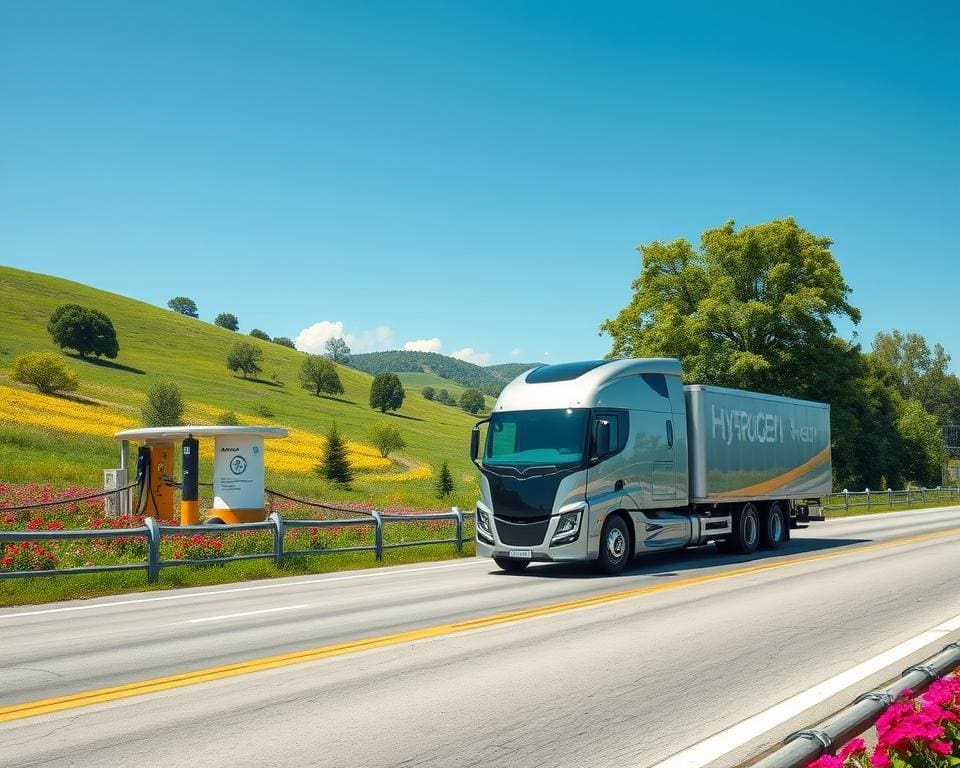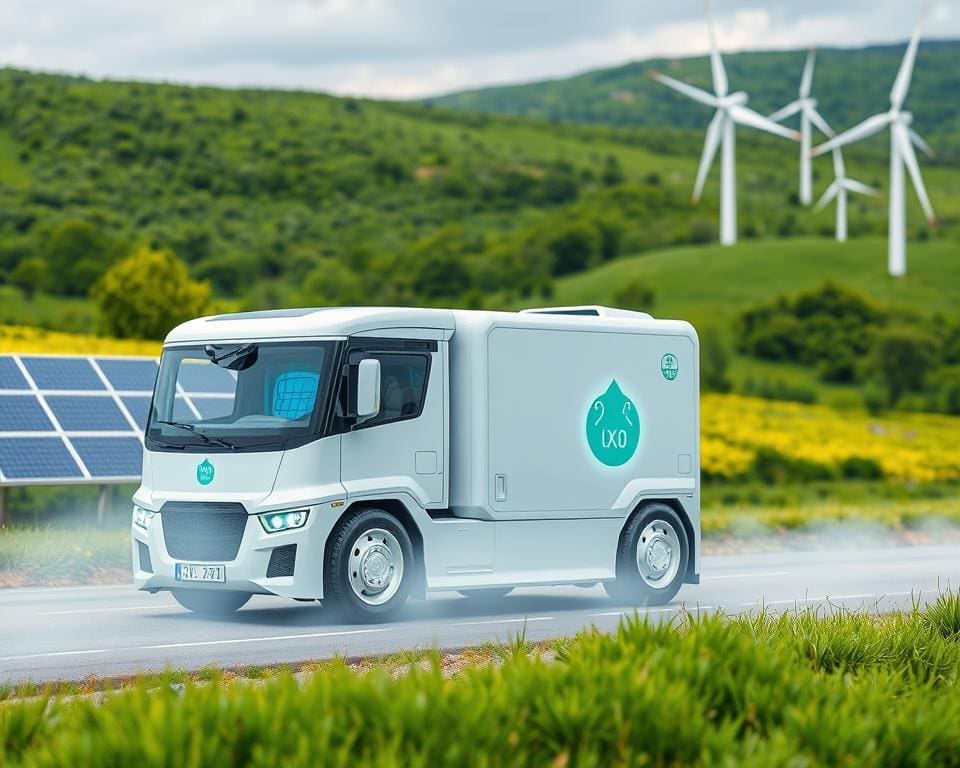As the world pivots towards more eco-conscious methods of transport, the rising prominence of eco-friendly trucks is redefining industry standards. With significant advances in hydrogen technology, these vehicles offer a sustainable alternative to traditional fossil fuels, markedly reducing harmful emissions. The transition to zero-emission trucks is not just vital for environmental integrity, but also essential for meeting evolving logistics and freight demands.
Industry leaders like Volvo and Daimler are at the forefront, championing the development of hydrogen-powered vehicles that align with the European Union’s ambitious environmental objectives. This collective shift towards sustainable transportation highlights a commitment to innovation, paving the way for a greener future.
The Role of Hydrogen in Sustainable Transportation
In the quest for cleaner transportation options, hydrogen emerges as a vital player. Its potential as a clean energy source significantly contributes to reducing the environmental impact of conventional fuels. Understanding the nuances of hydrogen production and its benefits lays the foundation for embracing this innovative energy carrier.
Understanding Hydrogen as a Clean Energy Source
Hydrogen as a Clean Energy Source can be produced in several ways, including electrolysis and reforming natural gas. This adaptability is crucial for integrating hydrogen into various energy systems. Hydrogen boasts a high energy density, making it an efficient fuel. Its availability further positions it as a promising alternative to traditional fossil fuels, aligning perfectly with goals for sustainable transportation.
Benefits of Hydrogen Fuel for Eco-Friendly Trucks
The Benefits of Hydrogen Fuel extend beyond energy efficiency. Implementing hydrogen-powered vehicles leads to lower greenhouse gas emissions and significantly reduced air pollutants compared to diesel options. Eco-friendly trucks equipped with hydrogen fuel cells experience faster refuelling times than battery electric vehicles, making them more practical for commercial use. These enhancements not only support sustainability but encourage broader adoption of hydrogen technology in the transportation sector.

Innovations in Hydrogen Fuel Cell Vehicles
The landscape of transportation is rapidly evolving due to exciting advances in hydrogen technology. Innovators are continuously working to enhance the efficiency and performance of hydrogen fuel cell vehicles. Recent breakthroughs have made these vehicles lighter, more efficient, and equipped with advanced storage solutions. This shift is crucial for the development of eco-friendly trucks that can compete with traditional fossil fuel-powered counterparts.
Recent Developments in Hydrogen Technology
Ongoing research into innovations in hydrogen technology has resulted in significant improvements to fuel cell systems. Engineers are focusing on enhancing fuel cell efficiency while reducing costs. The exploration of new materials has led to lighter fuel cell designs, offering improved performance for hydrogen fuel cell vehicles. Companies are also investing in research to create advanced hydrogen storage systems, ultimately increasing driving range and convenience for users.
Leading Manufacturers in Hydrogen Truck Production
Several leading manufacturers are at the forefront of the hydrogen truck revolution. Toyota, Hyundai, and Nikola are instrumental in pushing the boundaries of hydrogen fuel cell vehicle technology. Their commitment to sustainable transportation is evident in their investment in R&D and partnerships with energy companies. These collaborations aim to scale hydrogen production and build reliable distribution networks, paving the way for eco-friendly trucks to become an integral part of the transport sector.
Eco-Friendly Trucks: Advances in Hydrogen Tech
Hydrogen truck deployments are increasingly becoming a reality as logistics companies seek sustainable solutions to meet modern demands. The successful implementation of hydrogen-powered vehicles showcases the potential of this technology in revolutionising the transport sector. Companies like DHL and Amazon have undertaken significant projects, demonstrating the operational viability of hydrogen trucks across multiple applications, particularly in heavy-duty transport.
Case Studies of Successful Hydrogen Truck Deployments
These case studies offer a glimpse into how hydrogen technology transforms logistics. For example, DHL has introduced hydrogen-powered trucks in their operations, showcasing their commitment to sustainability. These deployments illustrate the reliability and performance of eco-friendly trucks, proving that efficiency can coexist with environmental responsibility. Similarly, Amazon has made strides in integrating hydrogen trucks into their fleet, enhancing delivery operations while reducing carbon emissions.
Comparative Analysis with Traditional Diesel Trucks
A thorough examination of the differences between hydrogen trucks and traditional diesel trucks reveals environmental and economic advantages. Hydrogen trucks produce zero emissions, significantly reducing the carbon footprint compared to their diesel counterparts. The operational costs associated with hydrogen-powered vehicles often show substantial savings when accounting for maintenance and fuel expenses. With continuous advances in hydrogen tech, the gap between traditional diesel and eco-friendly trucks continues to close, fostering an eco-conscious transition in the transportation landscape.
The Environmental Impact of Zero-Emission Trucks
The shift towards zero-emission trucks marks a significant milestone in sustainable transportation. Clean energy trucks offer a unique advantage in improving air quality and reducing harmful emissions. Research and case studies have demonstrated that the adoption of these vehicles leads to tangible benefits for both urban and rural environments.
Measuring Air Quality Improvements with Clean Energy Trucks
Air quality has seen substantial improvement due to the deployment of clean energy trucks. Research findings confirm that nitrogen oxides (NOx) and particulate matter (PM) emissions significantly drop when traditional diesel trucks are replaced with zero-emission alternatives. For instance, cities that actively incorporate these eco-friendly trucks report enhanced air quality indices, contributing to better public health.
Life Cycle Assessment of Hydrogen Trucks versus Conventional Vehicles
The life cycle assessment (LCA) of hydrogen trucks reveals their overall sustainability compared to conventional vehicles. This thorough analysis evaluates every stage of a vehicle’s life, from extraction of raw materials through to production and end-of-life disposal. Metrics such as energy consumption, greenhouse gas emissions, and resource depletion underline the advantages of eco-friendly trucks powered by hydrogen technology.
Challenges Facing Hydrogen-Powered Trucks
The transition to hydrogen-powered trucks represents a promising avenue towards sustainable transport. Yet, several critical challenges remain that must be addressed to facilitate widespread adoption and integration into the existing logistics chain.
Infrastructure Needs for Widespread Adoption
One of the most significant challenges facing hydrogen-powered trucks is the lack of adequate infrastructure. The establishment of refuelling stations and maintenance facilities is essential to ensure that these vehicles can operate efficiently across various regions. Currently, the scarcity of such infrastructure hinders the practicality of hydrogen trucks, creating concerns for fleet operators about the availability of refuelling options during transportation.
Cost Considerations and Economic Viability
Another challenge lies within the economic viability of hydrogen trucks. Initial investments in hydrogen technology are substantial, and fluctuations in hydrogen fuel pricing compared to diesel fuel can pose hesitancy among potential adopters. Companies evaluating the transition to eco-friendly trucks must consider not only the upfront costs but also the long-term savings and operational efficiencies hydrogen technology can offer. Expert insights indicate that government support plays a pivotal role in fostering an environment conducive to the growth of hydrogen-powered vehicles through research investments and incentives.
Government Initiatives and Policies Supporting Hydrogen Tech
As the world increasingly recognises the potential of hydrogen technology, numerous government initiatives have emerged to propel its development within the transportation sector. These plans prioritise a shift towards sustainable solutions, particularly in the commercial trucking industry.
Incentives for Eco-Friendly Truck Adoption
Encouraging the adoption of eco-friendly trucks requires robust incentives. Many governments offer programmes designed to make transitioning to hydrogen-powered vehicles economically viable for businesses. Benefits include:
- Tax rebates to offset initial investment costs.
- Grants to support research and development of hydrogen tech.
- Funding for infrastructure development, such as refuelling stations.
Such Government Initiatives aim to alleviate financial barriers while promoting a greener economy. With support from Hydrogen Tech Policies, these incentives make it more appealing for organisations to switch to hydrogen solutions.
International Collaboration on Hydrogen Technology Standards
The global nature of hydrogen technology necessitates international cooperation. Organisations such as the International Energy Agency (IEA) play a pivotal role in establishing consistent standards and regulations. Through international collaboration, countries can work towards:
- Harmonising protocols for hydrogen production and distribution.
- Streamlining certification processes for hydrogen vehicles.
- Sharing best practices and innovative solutions in hydrogen tech.
Such efforts ensure that nations align their Hydrogen Tech Policies, fostering a cohesive approach to sustainable transportation and paving the way for successful implementation of hydrogen across the globe.
The Future of Green Vehicles: A Vision Ahead
The future of green vehicles is bright, driven by significant advances in hydrogen tech. As the transportation sector evolves, eco-friendly trucks represent a pivotal shift towards sustainable logistics and energy efficiency. The integration of hydrogen fuel cells promises not only lower emissions but also enhanced performance, standing as a testament to the industry’s commitment to environmental stewardship.
Anticipated advancements in fuel cell efficiency and the development of robust hydrogen infrastructure indicate a transformative era for eco-friendly trucks. With increased collaboration between governments, manufacturers, and research institutions, the projection for market growth in hydrogen trucks is optimistic. This synergistic approach aims at fostering innovation, presenting a compelling narrative for stakeholders to embrace this transition.
The call for continued investment in hydrogen technology is essential as it lays the groundwork for a sustainable future in transport. By prioritising the adoption of eco-friendly trucks, stakeholders can collectively contribute to reducing their carbon footprint, enhancing air quality, and steering towards a greener tomorrow. The advancements in hydrogen tech are not only solutions for today but also a promising pathway to a healthier planet for future generations.









